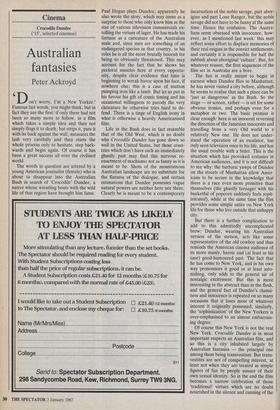Cinema
Crocodile Dundee ('15', selected cinemas)
Australian fantasies
Peter Ackroyd
Don't worry, I'm a New Yorker.' Famous last words, you might think, but in fact they are the first: if only there had not been so many more to follow, in a film which takes a simple idea and then not simply flogs it to death, but strips it, puts it with its back against the wall, measures the lash very carefully and then starts the whole process only to hesitate, step back- wards and begin again. Of course it has been a great success all over the civilised world.
The words in question are uttered by a young American journalist (female) who is about to disappear into the Australian Bush in search of 'Crocodile' Dundee, a native whose wrestling bouts with the wild life of that region have brought him fame. Paul Hogan plays Dundee; apparently he also wrote the story, which may come as a surprise to those who only know him as the star of various television commercials ex- tolling the virtues of lager. He has made his fortune as a caricature of the Australian male and, since men are something of an endangered species in that country, in his roles he is all the more brutally boorish for being so obviously threatened. This may account for the fact that he shows his pectoral muscles here at every opportu- nity, despite clear evidence that time is beginning to wreak havoc upon his face, if nowhere else; this is a case of mutton pumping iron like a lamb. But let us put in his favour his gift of comic timing and his occasional willingness to parody the very caricature he otherwise tries hard to de- fend. There is a tinge of English irony in what is otherwise a heavily Americanised film.
Life in the Bush does in fact resemble that of the Old West, which is no doubt why Crocodile Dundee has gone down so well in the United States, but those coun- tries which don't have such an immediately ghastly past may find this nervous re- enactment of machismo not as funny as it is meant to be. Shots of the mountainous Australian landscape are no substitute for the flatness of the dialogue, and certain intimations that Dundee possesses vague natural powers are neither here nor there. Clearly he is meant to be a contemporary
incarnation of the noble savage, part abor- igine and part Lone Ranger, but the noble savage did not have to be funny at the same time. Hence the confusion. The Austra- lians seem obsessed with innocence, how- ever, as I mentioned last week: this may reflect some effort to displace memories of their real origins in the convict settlements, and certainly it is responsible for half the rubbish about aboriginal 'culture'. But, for whatever reason, the first sequences of the film set in Australia are a bore.
The fun is really meant to begin in earnest when Dundee flies to Manhattan; he has never visited a city before, although he seems to realise that such a place can be `just as dangerous' as the Bush. So the stage — or screen, rather — is set for some obvious ironies, and perhaps even for a metaphor or two. The basic premise is clear enough: here is an innocent reversing the direction of the Jamesian innocents and travelling from a very Old world to a relatively New one. He does not under- stand the operation of an escalator, has only seen television once in his life, and has the usual trouble with a bidet. This is the situation which has provoked ecstasies in American audiences, and it is not difficult to see why: the barbaric yawps of Dundee on the streets of Manhattan allow Amer- icans to be secure in the knowledge that there is a race even more primitive than themselves (the ghastly teenager with his bucketful of popcorn suddenly feels soph- isticated), while at the same time the film provides some simple satire on New York life for those who live outside that unhappy city.
But there is a further complication to add to this admittedly uncomplicated brew: Dundee, wearing his Australian version of the stetson, acts like some representative of the old cowboy and thus reminds the American cinema audience of its more manly, heroic and (at least in his case) good-humoured past. The fact that he has come to New York, and in his own way pronounces it good or at least asto- nishing, only adds to the general air of nostalgic excitement. But this is more interesting in the abstract than in the flesh, and the general fact of Dundee's clumsi- ness and innocence is repeated on so many occasions that it loses most of whatever interest it originally possessed; similarly, the 'sophistication' of the New Yorkers is over-emphasised to an almost embarrass- ing degree.
Of course this New York is not the real New York. Crocodile Dundee is in most important respects an Australian film, and so this is a city inhabited largely by Australian fantasies — the principal one among them being transvestism. But trans- vestites are not of compelling interest, at least not when they are treated as simple figures of fun by people unsure of their own sexual identity. So in the end the film becomes a narrow celebration of those `traditional' virtues which are no doubt nourished in the silence and cunning of the Bush — the feminist journalist is not so liberated, after all, the Manhattan muggers are wimps, the sophisticated New Yorkers crumple in dismay at the sight of Dundee's manly fists, and so forth. Blah, blah, blah.











































 Previous page
Previous page